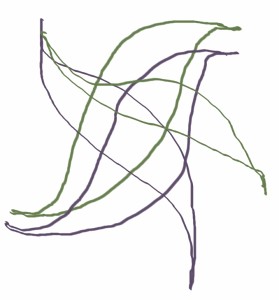Firstly, a thank you to Torbjörn and Steve for the conversations and feedback leading to these thoughts. Torbjörn has also written a post on this theme for those who have not yet seen it.
We can have a tendency to use linear and predictable as synonyms, but there are non-linear concepts that are also predictable and one of them is called hysteresis.
The easiest example of hysteresis is a thermostat for a heater. If we use one temperature setting to turn it on and off, then it will click on and off endlessly. If we set the on temperature just a little under the desired one and the off temperature just a little over it, then it works much better. When we walk into the room and measure the temperature only, then we cannot know if the heater is currently on or not without knowing the historical temperature and thus whether the room is currently cooling down or heating up.
So this is an example of a predictable process that is non-linear – we can use mathematical modelling to generate that predictability. I wonder if there are other processes that are non-linear, but still have some predictability in our work places.
One example might be change initiatives. We start at one level of understanding, do some training, coaching, communications and other ways of influencing change. After a period of time we move up to a new level of understanding. Then as other things happen and new people join the group, we lose some of that understanding – but it is likely that we are still above the original level.
I’m still looking for other examples – but hypothetically, a whole bunch of non-linear processes over-lapping and intersecting with each other would likely look like a very complex system.
 Of course, mathematically, we would then be able to demonstrate these parts of the system and their predictability – but that is not really the point. We are all observers of our world and how we experience it as individuals is different for each of us. Therefore, the natures of systems that we interact with will differ according to our experiences of them and what seems predictable to one person can appear quite random to another one.
Of course, mathematically, we would then be able to demonstrate these parts of the system and their predictability – but that is not really the point. We are all observers of our world and how we experience it as individuals is different for each of us. Therefore, the natures of systems that we interact with will differ according to our experiences of them and what seems predictable to one person can appear quite random to another one.
Back to the title of this post – along the gradient of predictability, we move from linear with obvious cause and effect to non-linear, such as hysteresis with less obvious correlation, then towards a lot less certainty where the relationships are dispositional and then to randomness. Most of the time whatever we are observing is likely to have a mixture of these attributes both inherently and from the ways that we experience it. Taking the example of a thermostat, I wonder how many other things also appear quite simple and are really elegantly complicated and on the flip side, how many things appear complex and are likely non-linear, but still predictable?

Aren’t deterministic systems Complicated rather than Complex?
Hi Anthony, how we observe or experience a system and its parts can vary – so our experience of it might be that it appears complex when it appears as complicated to another person. This is where facilitation methods can help a group in a situation to come to an agreement about a type of system.
That sounds like the situation has entered, from the right hand side, Disorder.